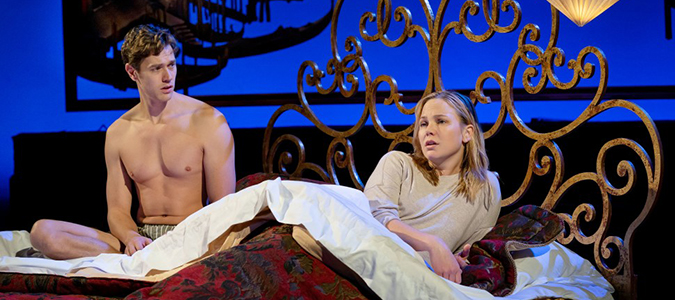

The Hard Problem
Opening Night: November 19, 2018
Closing: January 6, 2019
Theater: Lincoln Center Theater
It has been a dozen years since Tom Stoppard lit up the Beaumont stage with his brilliant play, The Coast of Utopia. That extraordinary trilogy thrilled New York audiences over the course of a whole season and won 7 Tony Awards including Best Play. Lincoln Center Theater also presented Stoppard’s Arcadia, The Invention of Love, Hapgood and Rock ‘N’ Roll, and now he’s back at LCT with his first new play in ten years. THE HARD PROBLEM is a powerful take on a contemporary dilemma, filled with provocative discourse and quick wit. THE HARD PROBLEM introduces a young woman, Hilary (Adelaide Clemens), a psychology student who is newly employed as a research assistant at a neuroscience think-tank financed by a hedge-fund billionaire. He believes the brain and the ability to map and understand it are the key to predicting financial patterns, human behavior and more. But as Hilary’s career advances she and her colleagues struggle with what scientists call ‘the hard problem’ which asks: if the brain is made of nothing but facts, what is consciousness? For Hilary the possibility of genuine altruism, without a hidden Darwinian self-interest, depends on the answer. Meanwhile she is nursing a private sorrow. She needs a miracle and prays for one every day.
BUY TICKETSREAD THE REVIEWS:
November 19, 2018
Yet as the characters in “The Hard Problem” argue and argue and argue — at work, at parties, during Pilates sessions, in bed — about the essence of human behavior, the stakes seldom feel compellingly high. Abstractly, this play may be taking on the biggest concepts imaginable, yet on stage it feels disappointingly small. Mr. Stoppard, always a tireless self-editor, has tweaked and massaged “The Hard Problem” since I first saw it at the National Theater in London. And Mr. O’Brien’s staging feels lighter on its feet than Nicholas Hytner’s original version. Yet it is hard to avoid the impression that “The Hard Problem” — which often feels like the work of a precocious young neophyte rather than an old master — has yet to solve itself.
READ THE REVIEW


















